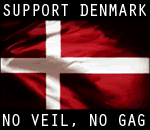Kateland,
I have given some thought to the questions raised in your post"
High time for the Reformation to come of age in Hollywood. You asked,
. . . . . While watching the movie what struck me as odd is that all these demon/devil films pit Catholics against the Devil/demons types.
Just why is it that Catholics are perceived by Hollywood as the last bastion of hope against the Dark? Where are the Baptists, Lutherans or the Pentecostals? I can understand there being no Presbyterians as the upper echelon of leadership of the USA Presbyterian Church seems to be on a mission to sanctify a number of very human monsters but really where are the other Protestants? Every notice that the devil/demon character types get a real hard on for either fallen or ex-priests? I have yet to see a demon/devil in a movie get very excited about the prospecting of receiving the soul of a United Church pastor.
1) "Just why is it that Catholics are perceived by Hollywood as the last bastion of hope against the Dark?" There are a variety of reasons for this, including some which deny the very premise upon which your question is based. It is not so much that Hollywood sees Catholics as the last bastion of hope as much as they see them as readily identified with one side of a necessary plot conflict. The evidence for this is found in their preoccupation with the Geneva Convention. Although this is often ignored by George Clooney in other contexts, Hollywood writers are well aware that the articles of the Geneva Convention require combatants to be in the uniform of the state they represent. This works out well because the Catholic priest's "uniform" is readily recognizable in most cultures. Although this is simply a different take on the "black hat - white hat" stereotypes of the old westerns, it does help avoid the need for character development in the movie and makes more room for crucifix-shaped shotguns.
This also helps Hollywood deal with the growing ignorance of Christianity, both in Hollywood and in the general populace. (One must remember that these movies are also shown in Europe, where Christianity is hardly even a fleeting memory. Most Europeans, however, do know that the Pope is in Rome - from whence, in times very past, he ruled Europe.) Thus while most people would be unaware of
Jesus' use of exorcism, they are aware that the Catholic Church has a well known history of exorcism - a history which extends at least as far back as "The Exorcist".
This lack of knowledge is also problematic because Hollywood has been left without a "go-to" Catholic to act as a translator with the departure of "Vichy" Jack Valenti. This leaves Hollywood with a rather awkward choice of sources for information on Catholicism between the likes of Paticia Heaton and Mel Gibson (disqualified because they actually believe that stuff) and, on the other hand, John Kerry and Ted Kennedy, who, while not officially actors, will act the part of being Catholic if it is expedient to do so. Their utility as actual spokesmen for Catholicism is lessened by their failure to remain current in the subject matter. I must admit that I am puzzled by the failure of
Andrew Greeley to ascend to the Holy See of Hollywood as he would seem to be the heir apparent. Perhaps there is some lurking Catholicism which disqualifies him.
2) "Where are the Baptists, Lutherans or the Pentecostals / where are the other Protestants?" The problem with the Protestants goes back to their lack of a "uniform". There are too many different Protestants to have a stereotype represent them all. While your typical Lutheran minister might have some nifty vestments for use on Sunday, they are largely undifferentiated from the rest of us on other days of the week. Let's face it, the ministerial collar looks more like a fashion accessory to a Nehru jacket rather than a uniform. This is especially true when worn with love beads (be sure to tuck the Cross into your pocket - wouldn't want to offend anyone). Baptists and Pentecostals have a larger problem: pompadour hairdos, white belts and white shoes do not a uniform make. While an army of Benny Hinns might be in bad taste, it hardly is scary - although it did feature prominently in one of my nightmares. This is simply a case where no one, except MoveOn.org and the Kos Kids, would expect the
Spanish Inquisition.
This is not to say, however, that Baptists and Pentecostals do not show up in these movies. Where do you think Hollywood finds their demons? There are many movies which would have been unthinkable without these Bible-Belt Beelzebubbas. Baptists virtually created
Kevin Bacon ex nihilo. A Lutheran
may or may not qualify as a demon. This is true of members of other Protestant denominations as well. Those who don't show up as demons are quite likely to show up as extras. Their uses are varied: the feckless minister with no answer, a National Council of Churches spokesman courageously speaking out against Zionism and the looming American Theocracy at a meeting of
CAIR, or
Gene Robinson shepherding the flock on Brokeback Mountain. These latter examples all "speak truth to power" and are considered to be acceptable spokesmen for Protestant Christianity. It should also be noted that it is entirely possible for an Evangelical to be allowed to work in the main house as long as they remember their place and "mind their p's and q's".
3) "Every(sic) notice that the devil/demon character types get a real hard on for either fallen or ex-priests? I have yet to see a demon/devil in a movie get very excited about the prospecting of receiving the soul of a United Church pastor." One must establish a context to properly frame the answer to this question. One need only consider the body of vampire literature to understand the appropriate application of the phrase "hard on". Many of the Vampire tales capture the absolutely seductive nature of evil. On the other hand, that most accomplished writer of seductive vampire literature and pornography,
Anne Rice, has found Christ even more "seductive". This, however, is not the context to which I refer. One must consult the story of
the Prodigal Son to answer your question. Although this parable is considered to be an allegory to show God's joy in our return to fellowship with Him, it also works to explain those who return to fellowship with other
"fathers". It may escape notice in all of this that the brother who remained seems to receive short shrift in the celebration.
In closing, I must note the contributions by a
friend who suggested "hiding the Cross in your pocket" and felt this whole thing could be summed up in the phrase: "PLOT DEVICE". Where is the poetry in that? I would also like to suggest two movies which show Christians fighting a different battle against demons. The first is a Canadian film,
Black Robe, which is available for rent. The second is a story of an event which occurred in my lifetime,
End of the Spear, which you may still find in the theater.








